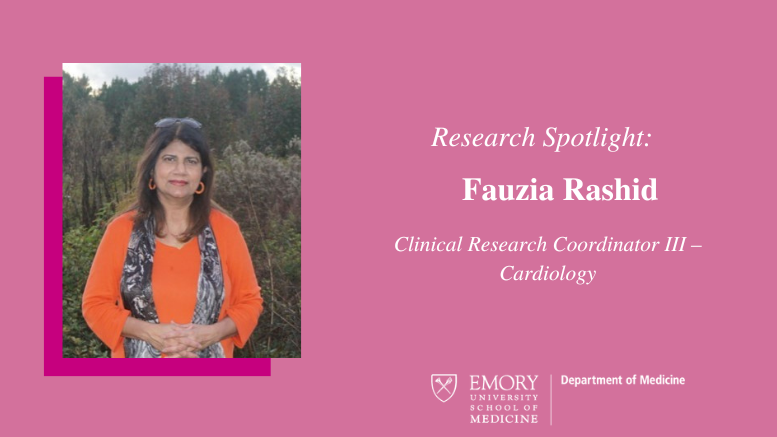Fauzia Rashid
Clinical Research Coordinator III – Cardiology
What is your professional background?
I obtained my PhD in Molecular Biology through a collaborative program between the University of Massachusetts and the University of Punjab, Pakistan, and worked at various institutions including the CDC. I began my research career at Emory in 2012 as a Lead Project Coordinator for Urban Health Initiative’s Dental Diversion Program and helped in the planning, development, and implementation of the project to better serve the underserved population in metro Atlanta. I earned my MPH from RSPH in 2013 and worked on a thesis project on melanin exposure in the U.S. population, under the mentorship of Dr. Dana Barr. I joined Dr. Puja Mehta’s research team in Cardiology in 2016 with a special focus on women’s heart disease, coronary microvascular dysfunction, cardiac biomarkers, and the role of mental stress in heart disease. I am currently a Senior Clinical Research Coordinator, and I oversee the day-to-day operations of our research program, including participant recruitment, coordinating and conducting study visits, aiding in grant submissions, data management, internal accounting, and oversight of research interns.
Which division do you work in? Who is your mentor?
I work in the Cardiology Division at Emory School of Medicine as a lead Clinical Research Coordinator under the mentorship of Dr. Puja K. Mehta. I am inspired by the mentors and the work that we do at the Women’s Heart Center and the Emory Clinical Cardiovascular Research Institute.
Briefly describe your research. Why is it important?
I am involved in multiple research studies focused on angina, coronary vascular dysfunction, and adverse outcomes, as well as cardiovascular prevention. Many patients with chest pain who are suspected of having myocardial ischemia and undergo coronary angiography are found to have no obstructive coronary artery disease and are often dismissed without a cardiac diagnosis or therapy. A large proportion of these patients, who are more likely to be women, have coronary vascular dysfunction and are at increased risk for future adverse cardiac events, including myocardial infarction and heart failure with preserved ejection fraction. These patients are impacted by their recurrent symptoms and have lower quality of life. Research studies to better understand the mechanisms contributing to abnormal vascular reactivity and high microvascular resistance are needed to better treat this clinical problem.
What do you like most about Emory?
I like the diverse community here and the many opportunities to collaborate at various departments/schools. I also like the great mix of traditional and modern architecture at the Emory campus.
What is your favorite movie or TV show?
I enjoy adventurous movies and political talk shows.
What do you like to do in your spare time?
I love to travel around the world and spend time with my family.
What is a fun fact about you?
I like to catch up with old friends and make new friends!


Be the first to comment on "Researcher Spotlight: Fauzia Rashid"